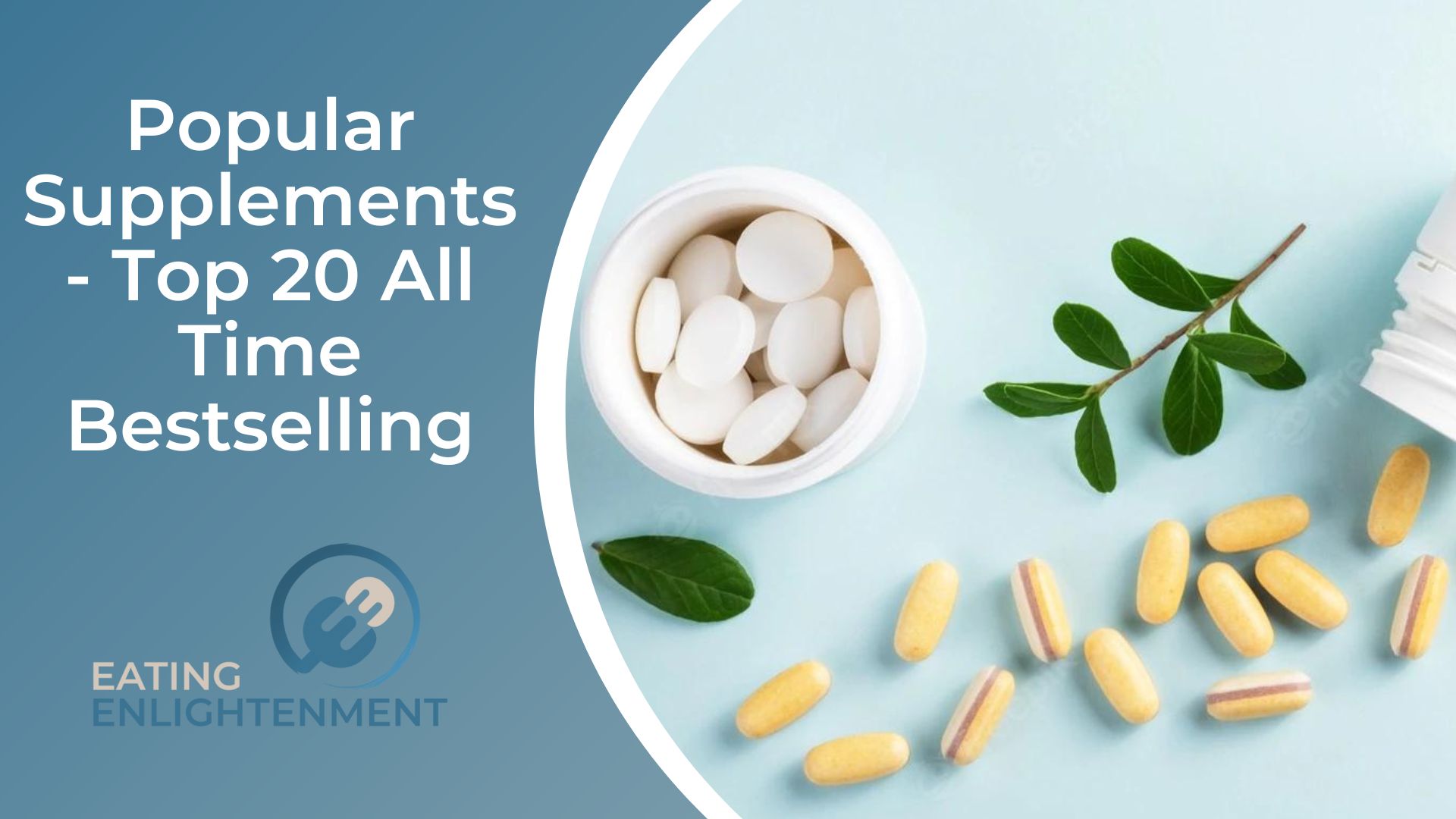Supplements are a huge industry.
People spend billions of dollars on supplements every year in the hopes of boosting their health and preventing disease.
There are hundreds of companies and thousands of vitamins, herbs, probiotics, and minerals.
With so much information out there, it can be hard to determine which dietary supplements you should be taking – and which ones you can skip.
In this blog post, we will discuss some of the most popular dietary supplements, how they work, their benefits, risks, dosages, and further resources.
So whether you’re just starting to think about supplements or you’re looking for more information on a specific one, this post has got you covered!
List of Popular Dietary Supplements
Besides sales data, one way to learn which supplements are most popular is through online surveys. While online surveys are notoriously unreliable, they can give us a rough estimate of the most popular supplements.
One such survey was conducted by ConsumerLab, a leading provider of independent test results and information to help consumers and healthcare professionals identify the best quality health supplements. 9,782 people in 2020 submitted responses to the ConsumerLab.com Survey of Vitamin and Supplement Users.
We discuss the results below.
Please know these results are not meant to be perfect and are several years old.
In this post we only cover the top 20 most popular supplements, based on the survey results. Notably this list does not include folate, folic acid, iron, supplements for prostate health, or other essential vitamins such as Vitamin A.
In particular, both folate and iron are great for women who are pregnant and don’t get enough iron.
Additionally, please know a balanced diet is the key to health and adequate vitamin intake.
Yes, the average American diet lacks many nutrients and supplements can help fill in nutrition gaps.
However, supplements are not a replacement for eating healthy. You should strive to get vitamins and minerals from your nutrition first and foremost.
1 – Vitamin D
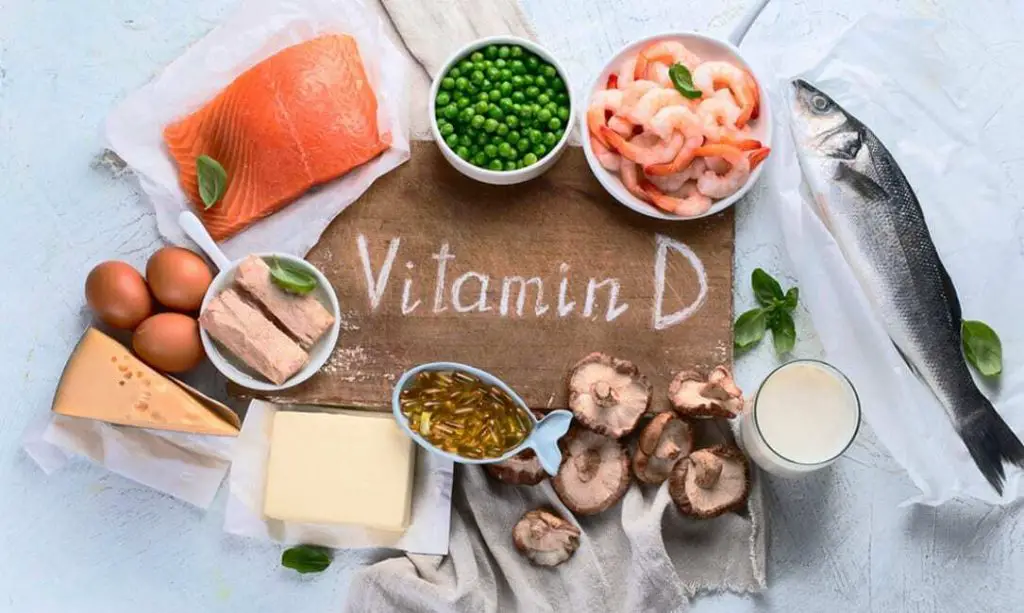
General info – Vitamin D is a fat-soluble vitamin that is naturally present in very few foods.
However, Vitamin D is added to some food and supplements, and you can also get Vitamin D from sun exposure! Aka, the sunshine vitamin!
Vitamin D promotes calcium absorption in the gut for bone growth and other functions.
How it works in the body – The body creates vitamin D from cholesterol when exposed to sunlight.
Vitamin D supplements are taken orally and come in two forms: vitamin D₃ (cholecalciferol) and vitamin D₂ (ergocalciferol).
Benefits – Vitamin D may improve bone health by helping the body absorb calcium, can reduce the risk of falls in older adults, and may help prevent osteoporosis.
Some research suggests that vitamin D may also play a role in the immune system and inflammation.
Additionally, there is some evidence that vitamin D may help reduce the risk of cancer, but more research is needed to confirm this.
What if you’re deficient – A vitamin D deficiency can cause softening of the bones or thin, brittle bones (osteoporosis). You can confirm whether or not you have a Vitamin D deficiency with a quick blood test.
These conditions can lead to an increased risk of bone fractures.
Risks – Vitamin D supplements are considered safe when taken in the recommended amounts. However, taking too much vitamin D can lead to negative side effects.
Foods that contain vitamin D – Fatty fish such as salmon, mackerel, tuna, and herring are among the best sources of vitamin D.
Dosages – The Recommended Dietary Allowance (RDA) for vitamin D is 600 international units (IU) per day for most adults between the ages of 19 and 70.
2 – Magnesium

General info – Magnesium is a mineral that is involved in over 300 biochemical reactions in the body.
It helps to maintain normal muscle and nerve function, supports a healthy immune system, and keeps the heart rhythm steady.
How it works in the body – Magnesium is absorbed in the small intestine and then stored in the bones.
Benefits – May improve heart health by reducing blood pressure and improving cholesterol levels.
Magnesium supplements may also help to relieve anxiety and improve sleep quality.
What if you’re deficient – A magnesium deficiency can cause muscle cramps, weakness, anxiety, and migraines.
Risks – Magnesium supplements are generally considered safe when taken in the recommended amounts.
However, taking too much magnesium can cause negative side effects such as diarrhea, nausea, and abdominal cramping.
Foods that contain – Magnesium is found in many foods, including green leafy vegetables, nuts, seeds, and whole grains.
Dosages – The RDA for magnesium is 310-420 mg per day for adults.
If you are taking a magnesium supplement, be sure to follow the package directions carefully.
3 – Fish Oil / Omega 3

General info – Fish oil is a type of fat that is derived from fish.
It is high in omega-three fatty acids, which promote heart health.
How it works in the body – The omega-three fatty acids in fish oil are thought to improve heart health by reducing inflammation and triglyceride levels.
They may also help to lower blood pressure, reduce the risk of stroke, and heart disease.
Benefits – May improve heart health by reducing inflammation and triglyceride levels, as well as lowering blood pressure and reducing the risk of stroke.
What if you’re deficient – A deficiency in omega-three fatty acids can lead to dry skin, joint pain, and fatigue.
Risks – Fish oil supplements are considered safe when taken in the recommended amounts.
However, taking too much fish oil can cause side effects such as indigestion, diarrhea, and nausea.
Foods that contain omega-three fatty acids – Fatty fish such as salmon, mackerel, tuna, and herring are among the best sources of omega-three fatty acids.
Dosages – The American Heart Association (AHA) recommends that adults consume at least two servings of fish per week to help prevent cardiovascular disease.
4 – Coenzyme Q10 (CoQ10)
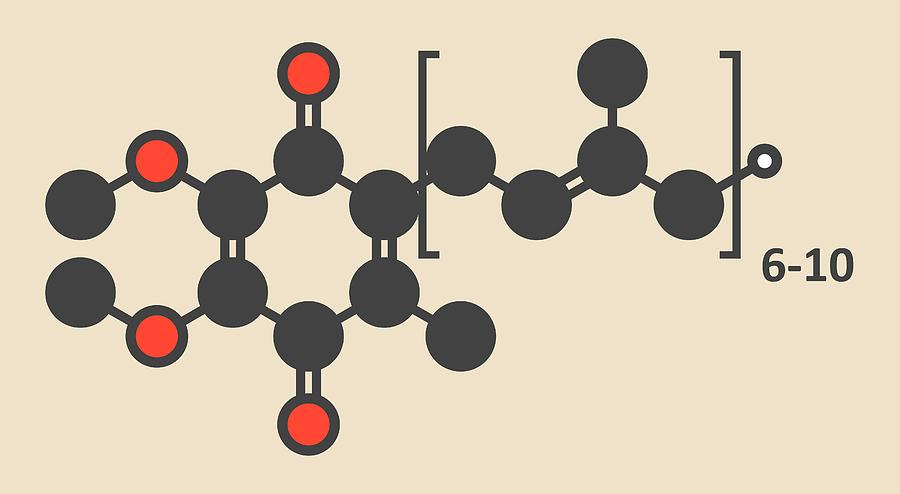
General info – CoQ10 is a nutrient that is found in every cell of the body.
It plays an important role in energy production and is also a powerful antioxidant.
How it works in the body – CoQ10 supplements are thought to improve heart health by reducing inflammation and improving blood flow.
They may also help to lower blood pressure and reduce the risk of stroke.
Benefits – May improve heart health by reducing inflammation and improving blood flow, as well as lowering blood pressure and reducing the risk of stroke.
What if you’re deficient – A deficiency in CoQ10 can lead to fatigue, muscle weakness, and heart problems.
Risks – CoQ10 supplements are generally considered safe when taken in the recommended amounts.
However, taking too much CoQ10 can cause side effects such as nausea, diarrhea, and abdominal cramping.
Foods that contain – CoQ10 is found in many foods, including beef, chicken, pork, fish, nuts, and seeds.
Dosages – The recommended daily allowance for CoQ10 is 90-200 mg per day for adults.
5 – Multivitamin

General info – A multivitamin is a supplement that contains a variety of vitamins and minerals.
How it works in the body – Multivitamins are thought to improve overall health by providing the body with the essential nutrients it needs to function properly.
Benefits – May improve overall health by providing the body with the essential nutrients it needs to function properly.
What if you’re deficient – A deficiency in one or more vitamins or minerals can lead to a number of health problems.
Risks – Multivitamins are generally considered safe when taken as directed. However, taking too many multivitamins can lead to side effects such as nausea, vomiting, and diarrhea.
Foods that contain – Multivitamins are found in many foods, including fruits, vegetables, meat, poultry, and dairy products.
Dosages – The recommended daily allowance for multivitamins is 1 per day.
6 – Probiotic
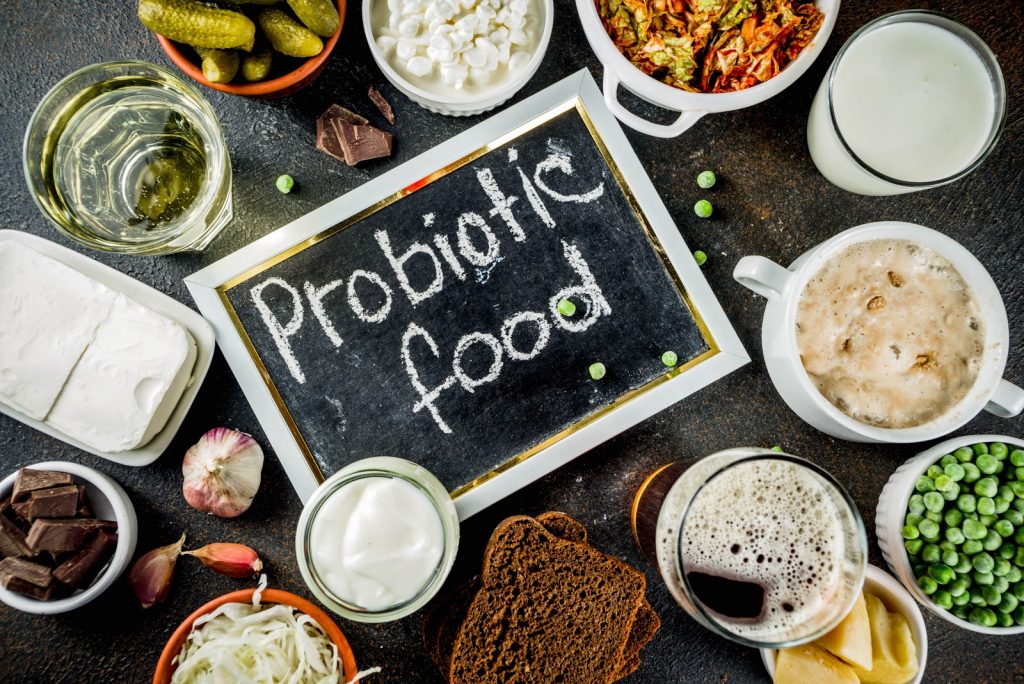
General info – Probiotics are live bacteria that are found in many foods, including yogurt, sauerkraut, and kimchi.
How it works in the body – Probiotics are thought to improve gut health by balancing the levels of good and bad bacteria in the gut.
Benefits – May improve gut health by reducing inflammation, helping the stomach absorb nutrients and other certain food groups.
What if you’re deficient – A deficiency in probiotics can lead to a number of gastrointestinal problems, such as diarrhea, constipation, and irritable bowel syndrome.
Risks – Probiotics are generally considered safe when taken as directed. However, taking too many probiotics can lead to side effects such as bloating, gas, and diarrhea.
Foods that contain – Probiotics are found in many foods, including yogurt, sauerkraut, and kimchi.
Dosages – The recommended daily allowance for probiotics is 10-20 billion CFUs per day for adults.
7 – Curcumin / Turmeric

General info – Curcumin is a yellow pigment that is found in the spice turmeric. On average, one 500mg of curcumin capsule would suffice per day.
How it works in the body – Curcumin supplements are thought to improve joint health by reducing inflammation and pain.
They may also help to protect against Alzheimer’s disease and cancer.
Benefits – May improve joint health by reducing inflammation and pain, as well as protecting against Alzheimer’s disease and cancer.
What if you’re deficient – A deficiency in curcumin can lead to a number of health problems, including arthritis, Alzheimer’s disease, and cancer.
Risks – Curcumin supplements are generally considered safe when taken as directed. However, taking too much curcumin can lead to side effects such as stomach pain, diarrhea, and constipation.
Foods that contain it – Curcumin is found in the spice turmeric.
Turmeric supplements are also available in many forms, including capsules, tablets, and powders.
Dosages – The recommended daily allowance for curcumin is 1.4 mg per pound of body weight per day for adults.
8 – Vitamin C

General info – Vitamin C is a water-soluble vitamin that is found in many fruits and vegetables.
How it works in the body – Vitamin C supplements are thought to improve immune system function by reducing inflammation and boosting the production of white blood cells.
Benefits – May improve immune system function by reducing inflammation and boosting the production of white blood cells.
What if you’re deficient – A deficiency in vitamin C can lead to a number of health problems, including scurvy, fatigue, and weakened immunity.
Risks – Vitamin C supplements are generally considered safe when taken as directed. However, taking too much vitamin C can lead to side effects such as nausea, vomiting, and diarrhea.
Foods that contain it – Vitamin C is found in many fruits and vegetables , including oranges, grapefruits, tomatoes, broccoli, and spinach.
Dosages – The recommended daily allowance for vitamin C is 75-90 mg per day for adults.
9 – B-Complex
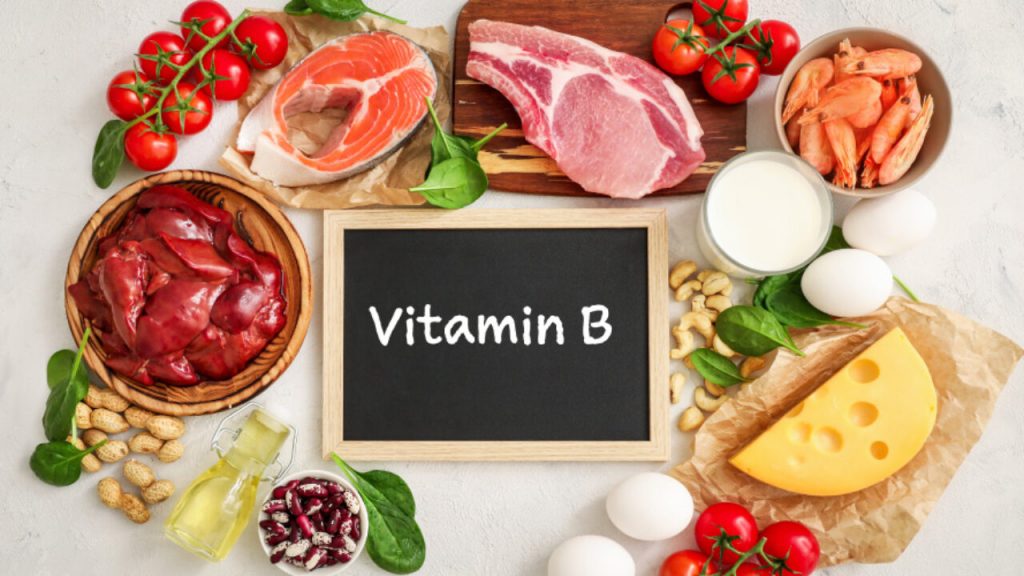
General info – B-complex vitamins are a group of water-soluble vitamins that are found in many foods.
How it works in the body – B-complex supplements are thought to improve energy levels by helping the body to convert food into energy. They may also help to reduce stress and anxiety.
Benefits – May improve energy levels by helping the body to convert food into energy , as well as reducing stress and anxiety.
What if you’re deficient – A deficiency in B-vitamins can lead to a number of health problems, including fatigue, anemia, and depression.
Risks – B-complex supplements are generally considered safe when taken as directed. However, taking too much of certain B-vitamins can lead to side effects such as nausea, vomiting, and diarrhea.
Foods that contain it – B-vitamins are found in many foods, including meat, poultry, fish, eggs, and dairy products.
Dosages – The recommended daily allowance for B-vitamins is 50-100 mg per day for adults.
10 – B-12

General info – Vitamin B12 is a water-soluble vitamin that is found in many foods.
How it works in the body – Vitamin B12 supplements are thought to improve energy levels by helping the body to convert food into energy. They may also help to reduce stress and anxiety.
Benefits – May improve energy levels by helping the body to convert food into energy , as well as reducing stress and anxiety.
What if you’re deficient – A deficiency in vitamin B12 can lead to a number of health problems, including fatigue, anemia, and depression.
Risks – Vitamin B12 supplements are generally considered safe when taken as directed. However, taking too much vitamin B12 can lead to side effects such as nausea, vomiting, and diarrhea.
Foods that contain it – Vitamin B12 is found in many foods, including meat, poultry, fish, eggs, and dairy products.
Dosages – The recommended daily allowance for vitamin B12 is 2.4 mcg per day for adults.
11 – Calcium
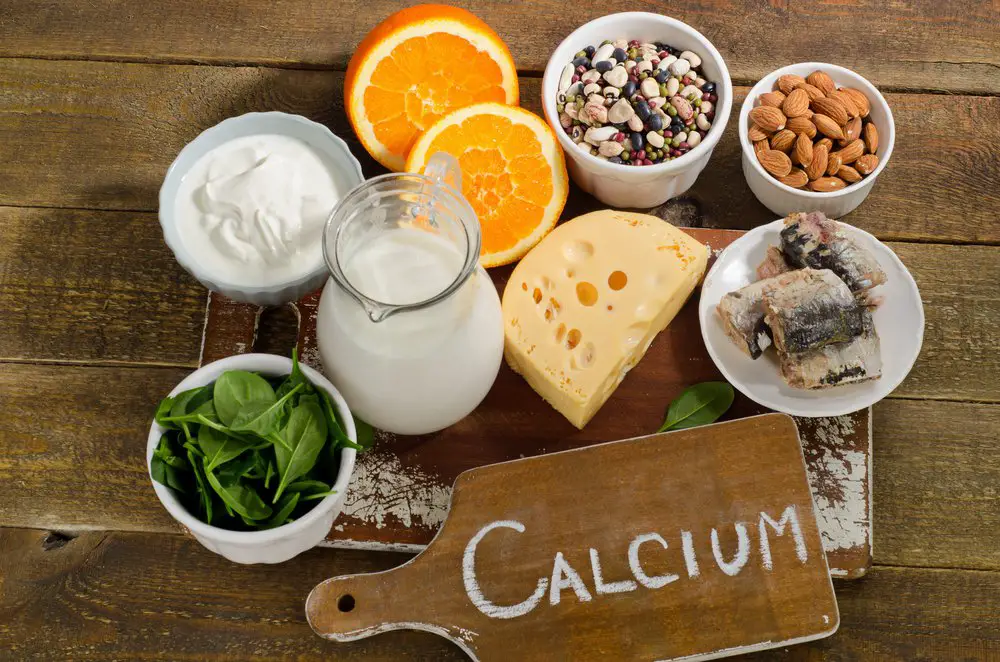
General info – Calcium is a mineral that is found in many foods.
How it works in the body – Calcium supplements are thought to improve bone health by increasing bone density and preventing osteoporosis. They may also help to reduce the risk of fractures.
Benefits – May improve bone health by increasing bone density and preventing osteoporosis , as well as reducing the risk of fractures .
What if you’re deficient – A deficiency in calcium can lead to a number of health conditions, including osteoporosis, weak bones, and tooth decay.
Risks – Calcium supplements are generally considered safe when taken as directed. However, taking too much calcium can lead to side effects such as constipation and kidney stones.
You may want to try a calcium citrate if you struggle digesting calcium in tablet form.
Foods that contain it – Calcium is found in many foods, including dairy products, leafy green vegetables, and fortified cereals.
Dosages – The recommended daily allowance for calcium is 1000 mg per day for adults.
12 – Melatonin
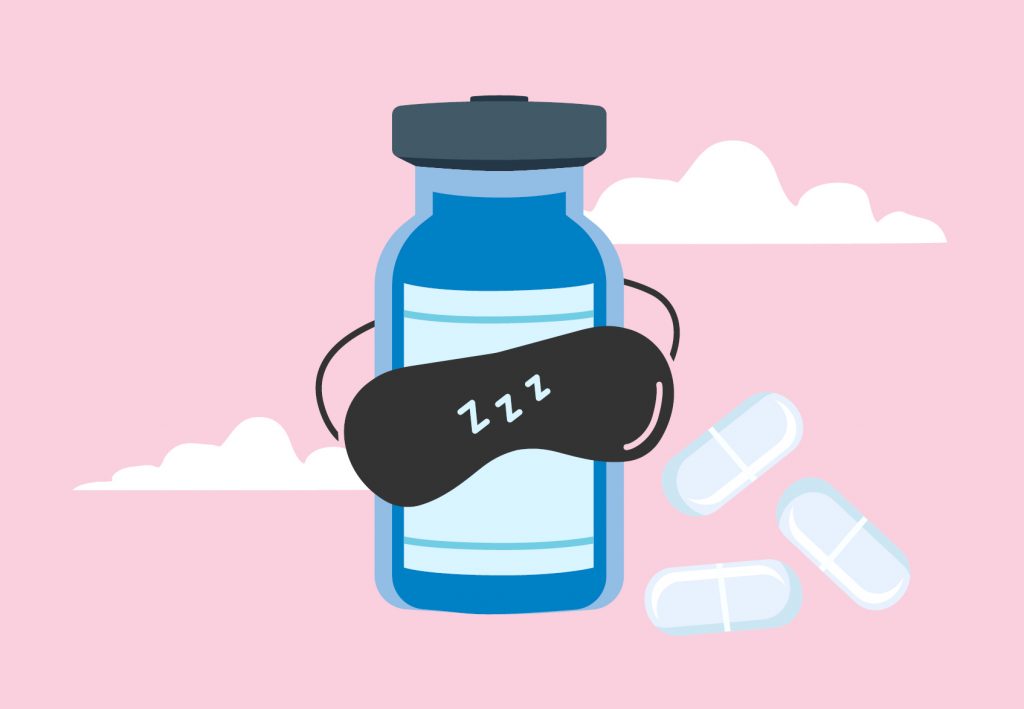
General info – Melatonin is a hormone that is produced by the pineal gland.
How it works in the body – Melatonin supplements are thought to improve sleep quality by regulating the body’s sleep-wake cycle. They may also help to reduce jet lag and insomnia.
Benefits – May improve sleep quality by regulating the body’s sleep-wake cycle , as well as reducing jet lag and insomnia .
What if you’re deficient – A deficiency in melatonin can lead to a number of health problems, including sleeplessness, anxiety, and depression.
Risks – Melatonin supplements are generally considered safe when taken as directed. However, taking too much melatonin can lead to side effects such as drowsiness, headaches, and nausea.
Foods that contain it – Melatonin is found in many foods, including meats, grains, fruits, and vegetables.
Dosages – The recommended daily allowance for melatonin is 0.25-0.50 mg per day for adults with sleep issues.
13 – Zinc

General info – Zinc is a mineral that is found in many foods.
How it works in the body – Zinc mineral supplements are thought to improve immunity by preventing the common cold and other infections. They may also help to reduce the risk of cancer.
Benefits – May improve immunity by preventing the common cold and other infections , as well as reducing the risk of cancer .
What if you’re deficient – A deficiency in zinc can lead to a number of health problems, including weakened immunity, diarrhea, and hair loss.
Risks – Zinc mineral supplements are generally considered safe when taken as directed. However, taking too much zinc can lead to side effects such as nausea, vomiting, and diarrhea.
Foods that contain it – Zinc is found in many foods, including meats, seafood, nuts, and seeds.
Dosages – The recommended daily allowance for zinc is 8-11 mg per day for adults.
14 – Vitamin K
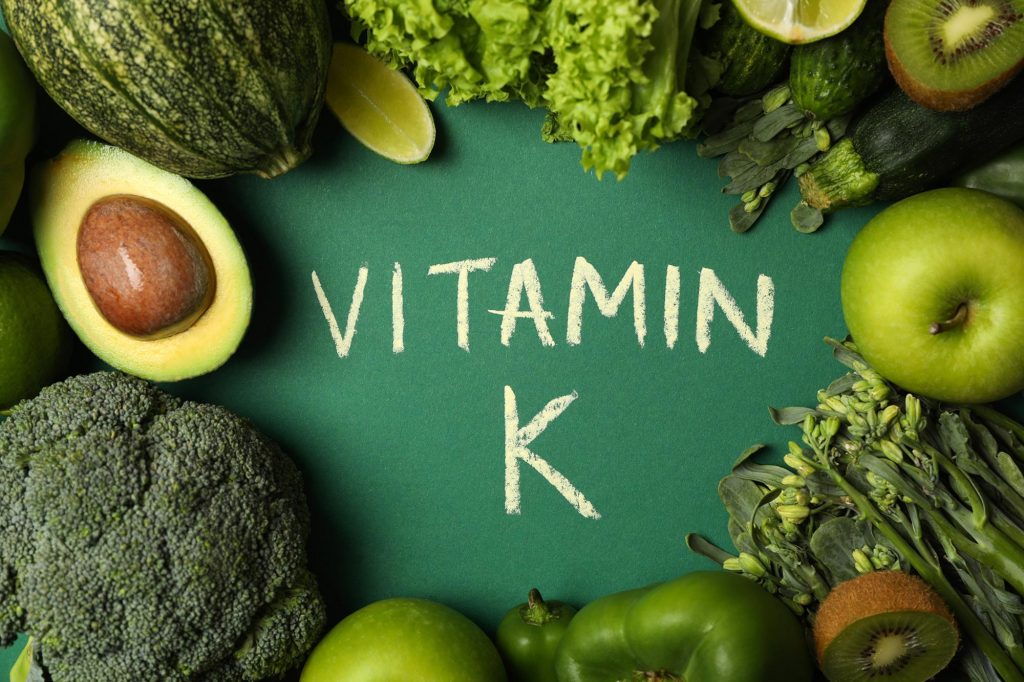
General info – Vitamin K is a vitamin that is found in many foods.
How it works in the body – Vitamin K supplements are thought to improve blood clotting by preventing bruising and bleeding. They may also help to reduce the risk of stroke.
Benefits – May improve blood clotting by preventing bruising and bleeding , as well as reducing the risk of stroke .
What if you’re deficient – A deficiency in vitamin K can lead to a number of health problems, including easy bruising, excessive bleeding, and anemia.
Risks – Vitamin K supplements are generally considered safe when taken as directed. However, taking too much vitamin K can lead to side effects such as nausea, vomiting, and diarrhea.
Foods that contain it – Vitamin K is found in many foods, including leafy green vegetables, tomatoes, and fortified cereals.
Dosages – The recommended daily allowance for vitamin K is 90-120 mcg per day for adults.
15 – Apple Cider Vinegar

General info – Apple cider vinegar is a type of vinegar made from apples.
How it works in the body – Apple cider vinegar supplements are thought to improve heart health by lowering cholesterol and blood pressure. They may also help to reduce the risk of cancer.
Benefits – May improve heart health by lowering cholesterol and blood pressure , as well as reducing the risk of cancer .
What if you’re deficient – No real problems.
Risks – Apple cider vinegar supplements are generally considered safe when taken as directed. However, taking too much apple cider vinegar can lead to side effects such as nausea, vomiting, and diarrhea.
Foods that contain it – Apple cider vinegar is found in many foods, including salad dressings, marinades, and pickled vegetables.
Dosages – Please note there is no official recommended daily allowance for apple cider vinegar, but generally speaking around 1-2 teaspoons per day for adults.
16 – Green Tea

General info – Green tea is a type of tea made from the leaves of the Camellia sinensis plant.
How it works in the body – Green tea supplements are thought to improve heart health by lowering cholesterol and blood pressure. They may also help to reduce the risk of cancer.
Benefits – May improve heart health by lowering cholesterol and blood pressure , as well as reducing the risk of cancer .
What if you’re deficient – No real problems.
Risks – Green tea supplements are generally considered safe when taken as directed. However, drinking too much green tea can lead to side effects such as nausea, vomiting, and diarrhea.
Foods that contain it – Green tea is found in green tea!
Dosages – Please note there is no official recommended daily allowance for green tea. A general idea is 250-500 mg per day for adults.
17 – Collagen

General info – Collagen is a type of protein found in the skin, tendons, and bones.
Collagen supplements are available in many forms, including capsules, tablets, and powders.
How it works in the body – Collagen supplements are thought to improve the health of the skin by reducing wrinkles and fine lines. They may also help to reduce the risk of osteoporosis.
Benefits – May improve the health of the skin by reducing wrinkles and fine lines, as well as reducing the risk of osteoporosis .
What if you’re deficient – A deficiency in collagen can lead to a number of health problems, including dry skin, brittle nails, and joint pain.
Risks – Collagen supplements are generally considered safe when taken as directed. However, taking too much collagen can lead to side effects such as nausea, vomiting, and diarrhea.
Foods that contain it – Collagen is found in many foods, including fish, chicken, and beef.
Dosages – The recommended daily allowance for collagen is between 2.5-15 grams per day for adults.
18 – Cocoa

General info – Cocoa is a type of powder made from the beans of the cacao tree.
How it works in the body – Cocoa supplements are thought to improve heart health by lowering cholesterol and blood pressure. They may also help to reduce the risk of cancer.
Benefits – May improve heart health by lowering cholesterol and blood pressure , as well as reducing the risk of cancer .
What if you’re deficient – A deficiency in cocoa can lead to a number of health problems, including indigestion, heartburn, and acid reflux.
Risks – Cocoa supplements are generally considered safe when taken as directed. However, taking too much cocoa can lead to side effects such as nausea, vomiting, and diarrhea.
Foods that contain it – Cocoa is found in many foods, including chocolate, cookies, and cakes.
Cocoa supplements are also available in many forms , including capsules, tablets, and liquids.
Dosages – The recommended daily allowance for cocoa is between 1-10 grams per day for adults.
19 – Protein Powders
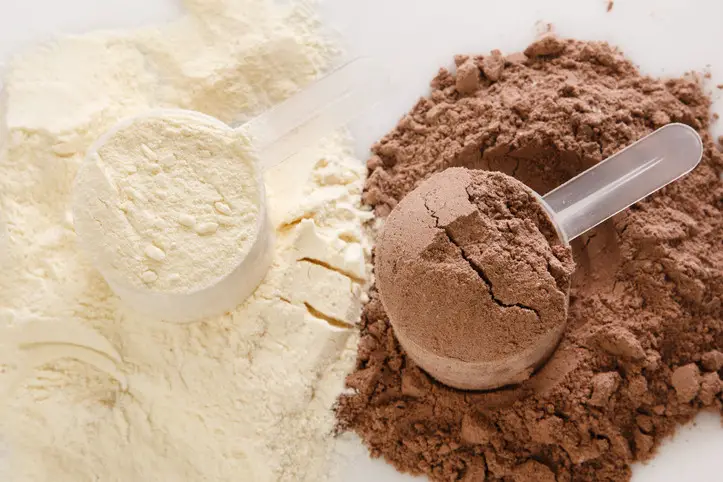
General info – Protein powders are supplements made from protein-rich foods, such as milk or eggs.
How it works in the body – Protein supplements are thought to improve muscle mass and strength. They may also help to reduce the risk of obesity.
Benefits – May improve muscle mass and strength, as well as reducing the risk of obesity.
What if you’re deficient – A deficiency in protein can lead to a number of health problems, including muscle weakness, fatigue, and weight gain.
Risks – Protein supplements are generally considered safe when taken as directed. However, taking too much protein can lead to side effects such as nausea, vomiting, and diarrhea.
Foods that contain it – Protein is found in many foods, including meat, poultry, and beans.
Dosages – The recommended daily allowance for protein is about 0.8 grams per kilogram of body weight.
20 – Coconut Oil

General info – Coconut oil is a type of oil made from the meat of coconuts.
How it works in the body – Coconut oil supplements are thought to improve heart health by lowering cholesterol and blood pressure. They may also help to reduce the risk of cancer.
Benefits – May improve heart health by lowering cholesterol and blood pressure , as well as reducing the risk of cancer.
What if you’re deficient – A deficiency in coconut oil can lead to a number of health problems, including dry skin, brittle nails, and joint pain.
Risks – Coconut oil supplements are generally considered safe when taken as directed. However, taking too much coconut oil can lead to side effects such as nausea, vomiting, and diarrhea.
Foods that contain it – Coconut oil is found in many foods, including chocolate, cookies, and cakes.
Dosages – The recommended daily allowance for coconut oil is about two tablespoons per day.
Supplements I Should Be Taking Conclusion
It’s important to be aware of the vitamin and mineral supplements you can be taking in order to maintain your health.
The dietary supplements listed in this article are some of the most common ones, and all have various benefits. Be sure to check out our ultimate guide to supplements and vitamins!
Be sure to talk to a doctor before starting any new supplement regimen, as certain supplements may not be safe for everyone.
If you are already taking medications for heart disease, blood pressure or other medical conditions, please, please, please check with your doctor or registered dietitian first!
What are your favorite dietary supplements? Let us know in the comments below!


